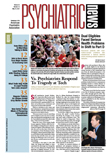Psychiatrists are increasingly being contacted by the media to comment on persons whose violent acts have captured national attention. The tragedy at Virginia Tech last month left the media clamoring for sound bites from psychiatrists and other mental health professionals. Sadly, it was mostly sensational commentary, including speculative opinions about the shooter (for example, he was “psychotic,” “delusional,”“ paranoid,” “schizophrenic,” “autistic”), which was deemed newsworthy. The reporting of responsible, scientifically based statements from our colleagues was the exception.
It is alarming and an embarrassment for our profession to have reckless assertions of this kind disseminated by the media. But they do serve the purpose of raising important questions about our professional conduct. How should our profession respond to requests for media interviews?
Psychiatrists are bound by the ethical code of the medical profession, specifically defined in The Principles of Medical Ethics of the AMA and in APA's The Principles of Medical Ethics With Annotations Especially Applicable to Psychiatry (hereafter “Principles”). These Principles are “standards of conduct that define the essentials of honorable behavior for the physician.” Within these Principles can be found clear direction on the ethical requirements for communicating with the media. Section 5 and Section 7 speak most directly to this issue:
Section 5 (emphasis added)
A physician shall continue to study, apply, and advance scientific knowledge, maintain a commitment to medical education, make relevant information available to patients, colleagues, and the public, obtain consultation, and use the talents of other health professionals when indicated.
Section 7.2 (emphasis added)
Psychiatrists may interpret and share with the public their expertise in the various psychosocial issues that may affect mental health and illness.
Educating the public about psychiatric matters and human behavior is not only ethical but laudable and encouraged by the Principles. There is still general misunderstanding about mental illness, and public education not only addresses this area, but also the associated stigmatization of persons who are mentally ill. What do the Principles specifically say about commenting on individuals in the public eye?
Section 7.3
On occasion psychiatrists are asked for an opinion about an individual who is in the light of public attention or who has disclosed information about himself/herself through public media. In such circumstances, a psychiatrist may share with the public his or her expertise about psychiatric issues in general. However, it is unethical for a psychiatrist to offer a professional opinion unless he or she has conducted an examination and has been granted proper authorization for such a statement.
This passage is referred to as the “Goldwater Rule.” How did this eponym come about? A presidential column by APA's 126th president, Herbert Sacks (1997–1998), explains its origin:
“We are reminded of the 1964 Goldwater-Johnson election, when 1,189 American psychiatrists responded to an inquiry for their opinions of the candidates by a now defunct magazine [Fact magazine]. The bulk of the political responses, couched in psychiatric terminology, were so unfair and so outrageous to Goldwater that he sued and won a substantial settlement. APA issued public statements decrying such analyses and in 1973, when The Principles of Medical Ethics With Annotations Especially Applicable to Psychiatry were drafted, Section 7.3 stated [see above].”
Dr. Sacks also noted in his column, “Psychobabble reported by the media undermines psychiatry as science.” His words remain true today.
When commenting on individuals in the public eye, psychiatrists should be governed by concerns for the potentially inflammatory and harmful consequences of their statements. The reputation of the public figures involved, their own credibility, and the dignity of our profession are at stake. Only after performing an examination and receiving an appropriate waiver of confidentiality should psychiatrists comment on persons in the light of public attention. Recent speculative and uninformed public statements made about the Virginia Tech shooter's mental state violate our Principles. Psychiatrists speaking to the media must avoid statements that are demeaning to the profession and our patients.
In the event an APA member is contacted by the media for an interview, we encourage him or her to first examine his or her motivation for responding. Is it to help educate the public about the science of mental illness, human behavior, and the interface between psychopathology and violence? If so, then providing responsible, measured information based on scientific literature—and not speculating about an individual who has neither been examined nor provided authorization for being discussed—is ethical and encouraged. On the contrary, if one's motivation is to seek fame or to increase referrals to one's practice, then just say no, as this is not ethical. Appropriate responses by psychiatrists will prove beneficial by educating the public, promoting the reputation of psychiatry, and protecting those persons subjected to public scrutiny.
The Principles of Medical Ethics With Annotations Especially Applicable to Psychiatry is posted on APA's Web site at<www.psych.org/psychpract/ethics/ethics.cfm>.▪
